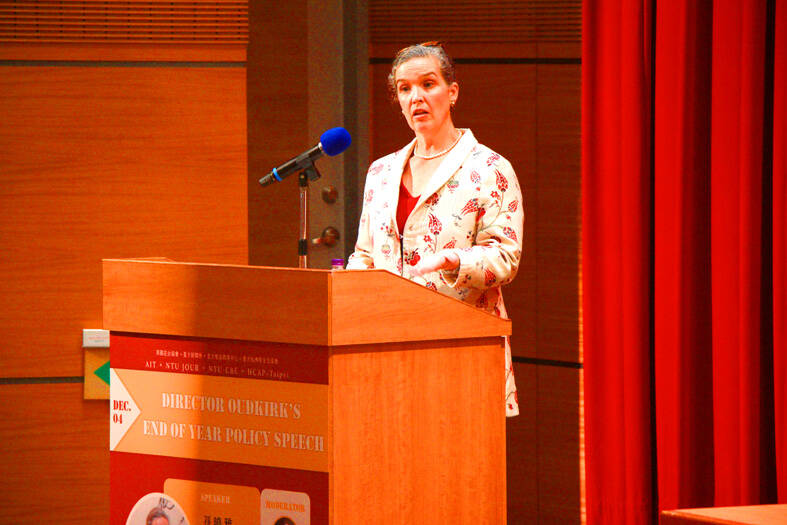Supporting Taiwan is one of the strongest consensuses in the US, American Institute in Taiwan (AIT) Director Sandra Oudkirk said yesterday, adding that the US is looking forward to working with whoever Taiwanese elect as president.
Oudkirk made the remark in a speech on cyberattacks and the manipulation of online information, at National Taiwan University (NTU) at the invitation of the school’s Graduate Institute of Journalism.
“I cannot think of a single other policy in Washington that is as strongly supported by both parties, both the administration and the [US] Congress, and is popular with the American people,” Oudkirk said.

Photo courtesy of National Taiwan University’s Graduate Institute of Journalism
There are people at the highest levels of the US government who were involved in drafting the Taiwan Relations Act, which serves as the guideline for the relations between Taiwan and the US, she said.
The “rock solid” support the US has for Taiwan “contributes to the maintenance of peace and stability across the Taiwan Strait,” Oudkirk said.
The US is working with Taipei to advance a shared vision of a free and open Indo-Pacific region that is connected, prosperous, secure and resilient — cooperation the AIT is striving to deepen, she said.
Having witnessed Taiwan’s democratic transition when she was posted in Taiwan as a visa officer in the 1990s, Oudkirk praised the nation as “a model of democracy” that is united by a broad commitment to defend a free, open and democratic society.
The US is “confident in Taiwan’s electoral processes and democratic system,” she said, adding that its policy on Taiwan “will remain the same, regardless of which party is in power.”
Oudkirk said that the US “is not taking sides in Taiwan’s election.”
Washington would also continue to support Taipei’s meaningful participation in the international community, she said.
Taiwan’s meaningful contributions to the world were clearly shown at the APEC meetings this year, such as its work with other APEC economies to help reduce the digital divide and encourage economic growth through digital transformation, Oudkirk said.
Working with Taiwan to effectively counteract cybersecurity threats has been one of the AIT’s priorities and a “common challenge” for Taiwan and the US, both of which continue to be targeted by cyberattacks, she said.
The two sides are collaborating on preventing and investigating cybercrime, providing capacity-building training for cyberprofessionals and policymakers, and bolstering Taiwan and US industry ties, Oudkirk said.
Industry should be involved in the formulation and implementation of cyberpolicies as it has advanced capabilities and tools to address and mitigate cyber-risks, as well as firsthand experience in protecting public and private networks, she said.
The US and Taiwan also work together to prevent disinformation from undermining public confidence in democracies and sowing division in societies — an effort that is especially important during election season, Oudkirk said.
An “active and informed public” is key to ensuring information integrity, so the US would continue to work with Taiwan and global partners to improve media literacy around the world, she said.
“We must support one another in these critical areas, because that is what partners do,” Oudkirk added.

Taiwan is stepping up plans to create self-sufficient supply chains for combat drones and increase foreign orders from the US to counter China’s numerical superiority, a defense official said on Saturday. Commenting on condition of anonymity, the official said the nation’s armed forces are in agreement with US Admiral Samuel Paparo’s assessment that Taiwan’s military must be prepared to turn the nation’s waters into a “hellscape” for the Chinese People’s Liberation Army (PLA). Paparo, the commander of the US Indo-Pacific Command, reiterated the concept during a Congressional hearing in Washington on Wednesday. He first coined the term in a security conference last

Prosecutors today declined to say who was questioned regarding alleged forgery on petitions to recall Democratic Progressive Party (DPP) legislators, after Chinese-language media earlier reported that members of the Chinese Nationalist Party (KMT) Youth League were brought in for questioning. The Ministry of Justice Investigation Bureau confirmed that two people had been questioned, but did not disclose any further information about the ongoing investigation. KMT Youth League members Lee Hsiao-liang (李孝亮) and Liu Szu-yin (劉思吟) — who are leading the effort to recall DPP caucus chief executive Rosalia Wu (吳思瑤) and Legislator Wu Pei-yi (吳沛憶) — both posted on Facebook saying: “I

Sung Chien-liang (宋建樑), who led efforts to recall Democratic Progressive Party (DPP) Legislator Lee Kun-cheng (李坤城), was released on bail of NT$80,000 today amid outcry over his decision to wear a Nazi armband to questioning the night before. Sung arrived at the New Taipei District Prosecutors’ Office for questioning in a recall petition forgery case last night wearing a red armband bearing a swastika, carrying a copy of Adolf Hitler’s Mein Kampf and giving a Nazi salute. Sung left the building at 1:15am without the armband and covering the book with his coat. Lee said today that this is a serious

A mountain blaze that broke out yesterday morning in Yangmingshan National Park was put out after five hours, following multi agency efforts involving dozens of fire trucks and helicopter water drops. The fire might have been sparked by an air quality sensor operated by the National Center for High-Performance Computing, one of the national-level laboratories under the National Applied Research Laboratories, Yangmingshan National Park Headquarters said. The Taipei City Fire Department said the fire, which broke out at about 11am yesterday near the mountainous Xiaoyoukeng (小油坑) Recreation Area was extinguished at 4:32pm. It had initially dispatched 72 personnel in four command vehicles, 16